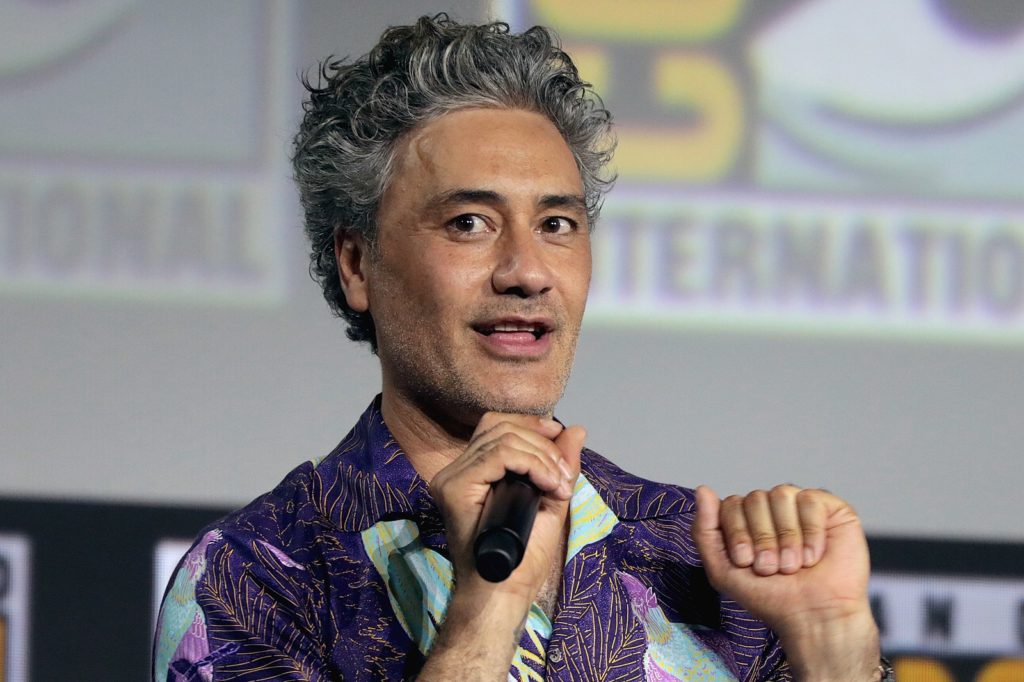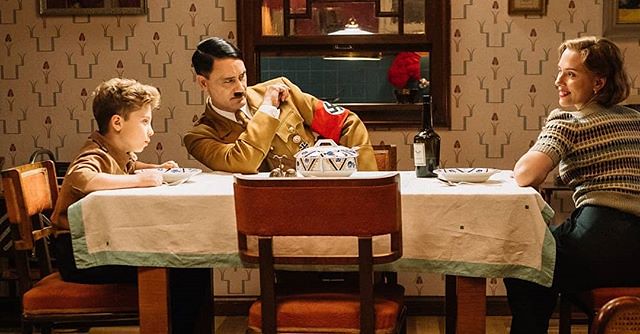“You’re not a Nazi, Jojo. You’re a ten-year-old kid who likes dressing up in a funny uniform and wants to be part of a club.”
The 2019 film Jojo Rabbit, which won the Academy Award for Best Adapted Screenplay as well as being nominated for Best Picture, was adapted from the 2008 novel Caging Skies by Christine Leunens. It was directed by and starred Taika Waititi, a Jewish-Maori New Zealand director and actor who had already received an Academy Award nomination for Best Short Film in 2003. The film was placed on the ‘Black List’, a selection of unproduced screenplays circulated amongst development executives in Hollywood, in 2012, but was not picked up until 2018. The film centres on Jojo, a ten-year-old Hitler Youth member who is forced to reassess his values when he discovers his mother is hiding a Jewish teenager behind a false wall in their attic. Waititi plays a version of Hitler who exists only in Jojo’s head and acts as his imaginary best friend and, later, an antagonist as Jojo grows to question the Nazi policies and antisemitism that had been so ingrained in him. Upon its release, the film was criticized for its levity in portraying Nazis and Nazi Germany.[1]

The film’s recurring themes are survival amid oppression, the limits of violence, and active resistance. At the beginning of the film, Jojo refuses to kill a rabbit to prove his devotion to the Nazi cause, despite his fervent belief in the ideas that have been brainwashed into him via the Hitler Youth movement. The thoughts that he has (personified by an imaginary friend, ‘Adolf’) demonstrate the power and danger of brainwashing, which can fill a young boy with hatred and violent instincts; but Jojo repeatedly steps back from violent acts at the last minute, and that injects the film with a sense of hope. His mother tries to protect him by encouraging his involvement in the Hitlter Youth (one aspect of survival); but she turns out to be an anti-Nazi agent who is eventually executed for her acts of resistance. Elsa, the girl in his attic, reveals to Jojo at the end of the film that his father is also working in the resistance while abroad. And Elsa and Jojo end up developing a strong friendship, despite Jojo’s initial aggression towards her. The films ‘heroes’ embody different ways to survive and oppose oppression, and its narrative arc shows people finding a hard-won peace despite all the violence along the way.
Jojo spends some of the film working to help the Nazi cause: he collects scraps from bins and writes a book using Elsa’s ironic and joking advice on how to spot a Jew. His contributions are both negligible and concerning at the same time, and they contribute to the film’s exploration of the role that children can play in war and the perpetration of violence. The Nazi activity detailed in the film is limited to the Hitler Youth, and Jojo’s book is aimed at children – so we see a child trying to pass on Nazi ideas he has absorbed to other children, as a willing but unwitting accomplice to those in power.
At the same time, we see human dialogue and friendship challenging prejudice and reducing the threat of Nazi ideology, as Jojo and Else get to know each other and some of Jojo’s ideas about Jews (learnt via the Hitler Youth) start to break down. At one point in the film, Jojo naively asks Elsa what she will do when the war ends; Elsa tells him the first thing she will do is dance. In the final moments of the film, Elsa and Jojo dance on the streets of an American-occupied Germany (to a German cover of David Bowie’s Heroes) as the credits roll.

Interestingly, this moment comes just after Jojo lies to Elsa, telling her that Germany has won the battle raging outside when in fact Americans have captured the city. This further serves to highlight the question of innocence and childhood in war, albeit through a darker lens: by lying to Elsa, Jojo has unwittingly told her that, at the very least, she will be forced to continue hiding – assuming she is not captured, brought to a concentration camp, and killed. Jojo’s ignorance of this fact highlights his childish innocence and lack of awareness which we can serve to both help and harm. Additionally, it reinforces a point made elsewhere in the film: that, while children can be a conduit for peace, they can just as easily contribute to the perpetuation of war and violence. Jojo oscillates between contributing to the Nazi cause through what little contributions he can make and helping Elsa and others in the film, and he struggles in the film with this duality, both within himself and with others.
Jojo Rabbit might be thought of as a ‘war film’ – but that simple classification overlooks its complex representation of life during conflict. As the story progresses, we see many different ‘pockets of peace’ and also a burgeoning friendship that helps us appreciate the role that dialogue, human interactions and everyday cohabitation can play in developing mutual understanding, breaking down prejudices and removing the drivers of conflict. In laying crucial foundations for conflict resolution and peace, in other words. In Jojo and Elsa’s relationship we see much to concern us and we are reminded how easily children can be brainwashed into perpetuating violence on adults’ behalf. But we also see some hope, as children resist the pressures they are put under, wrestle with competing motivations, and cross divides that adults have tried enforce. The top-down peace that comes at the end of the film, with the victory of American forces, sits alongside the slow development of a more complex, grassroots, everyday peace-making, as Jojo and Elsa find ways to dance rather than fight.
What do you think?
- What does the end of war – or peace – look like to you? How does your vision compare with what we see at the end of Jojo Rabbit? Would you say the film ends in peace?
- What happens to childhood in a war zone?
- What roles and responsibilities do stories like Jojo Rabbit suggest children can taken on in both perpetuating conflict and peace-making?
- Is Elsa fighting a war, and how does she do it?
- Whose war is Jojo fighting?
- What do we learn from the film about different kinds of survival and resistance? E.g. what model does Jojo’s mother offer, in working for the resistance herself while encouraging Jojo to conform?
- What is the effect of humor and satire on audiences, particularly when used in treating serious topics?
If you enjoyed this item in our museum…
You might also enjoy ‘Mother Night‘, ‘To Be Or Not to Be‘, ‘Achilles in Vietnam and Peace through Rehumanisation and other items with the tag ‘children‘.
Arden Henley, May 2022
[1] For a while range of reviews and analysis, see e.g.: Benjamin Franz, “Jojo Rabbit”; Gleiberman, Owen. “Film Review: ‘Jojo Rabbit.’” Variety, 8 September 2019: https://variety.com/2019/film/reviews/jojo-rabbit-review-taiki-waititi-1203328083/; Nandha, Aparna and Reji, Sandra, “Carnivalesque subversion and the narrative gaze of children: Taika Waititi’s Boy (2010), Hunt for the Wilderpeople (2016), and Jojo Rabbit (2019).” Studies in Australasian Cinema, volume 16, no. 1 (2022): p. 2-16: https://www.tandfonline.com/doi/full/10.1080/17503175.2022.2050591?scroll=top&needAccess=true; Scott, A. O. “’Jojo Rabbit’ Review: The Third Reich Wasn’t All Fun and Games.” The New York Times, 17 October 2019: https://www.nytimes.com/2019/10/17/movies/jojo-rabbit-review.html; Scully, Joseph. “Jojo Rabbit (2019). Directed by Taika Waititi.” Psychological Perspectives, volume 64 no. 1 (2021): p. 152-157: https://www.tandfonline.com/doi/full/10.1080/00332925.2021.1909392; Thomson, Graeme. “Parody and Political Critique in Jojo Rabbit.” Hudson Moura, 18 December, 2020: https://www.hudsonmoura.net/parody-and-political-critique-in-jojo-rabbit/; and Truitt, Brian. “Review: Love’s at the heart of Taika Waititi’s brilliant Nazi-mocking satire ‘Jojo Rabbit.’” USA Today, https://eu.usatoday.com/story/entertainment/movies/2019/10/17/jojo-rabbit-review-taika-waititi-mocks-hitler-brilliant-wwii-satire/3999929002/.